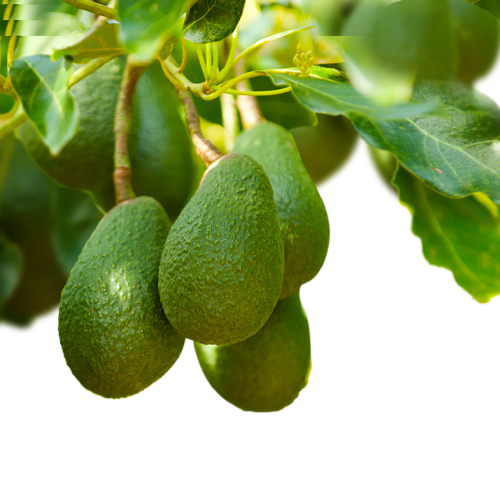Avocado, also known as "alligator pear," is a highly sought-after fruit globally, prized for its rich, creamy texture and numerous health benefits. The production of avocados is concentrated in regions like Mexico, Peru, Chile, and California, where ideal climate conditions foster the growth of this nutritious fruit.

Mexico: Mexico stands out as one of the largest producers of avocados worldwide. The states of Michoacán, Jalisco, and Guerrero are renowned for their avocado orchards, supplying a significant portion of the global market.
Peru: Peru has emerged as a major player in avocado production, with regions such as La Libertad, Lima, and Arequipa contributing substantially to the country's avocado exports.
Chile: Chilean avocados are prized for their premium quality, with regions like Valparaíso, Maule, and Coquimbo leading in avocado cultivation and export.
California: In the United States, California dominates avocado production, particularly in areas like San Diego, Ventura, and Santa Barbara counties, known for their Hass avocados.
Global Trade Dynamics
United States: The U.S. is one of the largest importers of avocados, with Mexico being a significant supplier due to proximity and trade agreements.
Europe: European countries such as the Netherlands, Spain, France, and the United Kingdom import substantial quantities of avocados, catering to the growing demand in the region.
China: With the rising popularity of avocados in Asian markets, China has emerged as a key importer, sourcing avocados from various production centers globally.
Japan: Avocado consumption in Japan has witnessed a surge in recent years, leading to increased imports from countries like Mexico, Peru, and Chile.
Health Consciousness: Avocados are lauded for their nutritional value, contributing to their popularity among health-conscious consumers.
Versatile Applications: Avocados are not only consumed fresh but also used in a wide range of products such as guacamole, salads, smoothies, and even skincare products.
Diversification of Varieties: While the Hass avocado remains dominant, there is growing interest in other varieties like Fuerte, Bacon, and Reed, offering diverse flavor profiles.
Sustainability Practices: Sustainable farming practices, organic certifications, and fair trade initiatives are gaining traction, aligning with consumer preferences for ethically sourced avocados.
The Avocado Market size is estimated at USD 22.69 billion in 2024, and is expected to reach USD 35.55 billion by 2029, growing at a CAGR of 9.40% during the forecast period (2024-2029).[1]
Avocados contain vitamins A, B, C, E, and K, including 25 essential nutrients. They also contain phytochemicals (like beta-sitosterol) and antioxidants (like lycopene and beta-carotene). These essential nutrients are boosting the demand for avocados globally, acting as major driving forces behind the growth of the market. The demand for avocados is increasing globally also due to their health benefits, as they improve vision, prevent heart-related diseases, and help improve digestion. The increased demand across the globe has resulted in increased production. According to the FAOSTAT, avocado production has increased by about 1 million metric tons, reaching 8.05 million metric tons in 2020. Mexico is the top avocado-producing country in the world, with an area of around 224,422 acres producing over 2.3 million tons in the year 2020.
Avocado farming requires a meticulous approach to ensure optimal growth and yield. An important factor in this process is the use of Super Absorbent Polymer (AvoSorb™), a revolutionary material that brings numerous benefits to every stage of avocado growth, especially for seeding, tranplanting and caring.
.png)
The avocado's journey begins at the seedling stage. AvoSorb™ plays a vital role by providing consistent moisture to fragile roots, promoting healthy germination and early growth. Its water-retaining properties ensure that even in dry climates or dry seasons, avocado seedlings receive adequate hydration for robust growth.
As avocado seedlings transition to their new environment during transplantation, AvoSorb™ continues to support their growth by providing moisture throughout the process. According to the case sharing, it state the survival rate of 99% for the transplanting period. By surrounding capillary root, AvoSorb™ can reduce irrigation frequency, helps conserve water and reduce labor and energy costs as well. The improvement in soil structure promoted by AvoSorb™ also promotes strong root development, laying the foundation for a strong and resilient avocado tree.
Young avocado trees require careful care to thrive, and AvoSorb™ provides them with the moisture they need during dry periods. It enhances soil aeration and moisture retention, creating an optimal environment for root growth and nutrient absorption. This in turn means healthier leaves, faster growth, and ultimately improved future fruit production.
.png)
Ripe avocado trees benefit greatly from the properties of AvoSorb™. By being mixed with organic fertilizer and acting at a soil depth of 40-50 cm, it can better guide tree roots to penetrate deeply. By effectively absorbing and retaining water, AvoSorb™ helps maintain soil moisture, which is especially important under drought or dry conditions. This not only enhances the tree's ability to withstand water stress, but also improves avocado fruit quality and quantity.
In addition to its direct impact on avocado growth, AvoSorb™ aligns with sustainable agricultural practices with its biodegradable feature, and by reducing water use and promoting efficient resource management. Its role in soil improvement and moisture regulation contributes to the long-term sustainability of avocado farming, ensuring a healthy ecosystem for continued production.
In summary, Super Absorbent Polymers (AvoSorb™) are a game changer in avocado farming. From nurturing seedlings to optimizing mature trees, AvoSorb™ has the ability to retain moisture, improve soil structure and enhance nutrient uptake to cultivate healthy, productive avocado orchards. Implementing AvoSorb™ not only increases yields, but also supports sustainable agricultural practices, making it a valuable asset during the avocado growing process.
[1]Mordor lntelligence Market Size of Avocado Industry